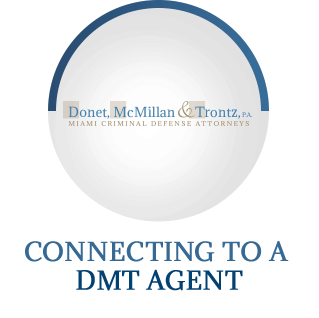What Are the Different Types of Embezzlement?
November 18, 2024
Embezzlement is a white-collar crime that involves the unauthorized taking or misappropriation of funds or property entrusted to someone's care, often for personal gain. In many cases, embezzlement occurs within a business or organization where an employee or representative has access to company assets. However, embezzlement can take many forms, and understanding the different types can help distinguish this crime from other forms of theft or fraud. Embezzlement cases can vary widely, from minor infractions involving small amounts of money to major schemes involving millions of dollars and complex financial manipulation.
At
Donet, McMillan & Trontz, P.A. , we understand the complexities surrounding embezzlement cases. This blog will explore the different types of embezzlement, the potential consequences, and what to do if you're facing embezzlement charges.

Understanding Embezzlement: A Brief Overview
Embezzlement occurs when someone in a position of trust misuses that trust to illegally obtain property or funds for personal benefit. This could involve a cashier pocketing money from the register, a financial manager rerouting funds to a personal account, or even a family member misusing a trust fund. Unlike general theft, which can occur without any pre-existing relationship between the parties involved, embezzlement specifically involves a breach of trust between the accused and the victim. Because embezzlement can involve various types of funds, assets, and levels of financial manipulation, it is often classified by the nature of the activity involved.
Types of Embezzlement
1. Employee Embezzlement
Employee embezzlement occurs when an employee misappropriates funds or assets from their employer. This is one of the most common forms of embezzlement and can involve various actions, such as:
- Cash Skimming: Employees might pocket cash from sales or transactions without recording it, often in a way that goes unnoticed in daily records.
- Payroll Fraud: Some employees add fake employees or manipulate payroll records to siphon extra money.
- Expense Reimbursement Fraud: Employees might submit false expense reports to receive reimbursement for non-existent or inflated business expenses.
Employee embezzlement can be challenging to detect, especially when the individual has a good reputation or holds a trusted position within the company.
2. Bank Embezzlement
Bank embezzlement occurs when an employee of a financial institution misappropriates funds from customers or the bank itself. This type of embezzlement can involve:
- Unauthorized Withdrawals: An employee may withdraw money from a customer's account or create unauthorized accounts to reroute funds.
- Loan Fraud: This occurs when bank employees manipulate loan applications to grant themselves or accomplices loans that are never intended to be repaid.
- Forgery: Bank employees may forge customer signatures to create fraudulent checks or authorize transactions without customer consent.
Bank embezzlement is taken seriously under federal law, as it can undermine trust in financial institutions and impact the broader economy.
 3. Government Embezzlement
3. Government Embezzlement
Government embezzlement, also known as public sector embezzlement, involves a public official or government employee misappropriating public funds or property. This type of embezzlement can range from local levels to federal agencies and often involves misuse of taxpayer money. Examples include:
- Budget Misallocation: Officials may reroute funds intended for public projects to their accounts or use them for unauthorized purposes.
- Misuse of Government Equipment: Some cases involve government employees using government property, such as vehicles or computers, for personal gain or to support another enterprise.
- Bribery and Kickbacks: Officials might accept bribes or kickbacks for awarding contracts or approving projects, redirecting funds meant for public use.
4. Corporate Embezzlement
In corporate embezzlement, executives or high-ranking employees take advantage of their positions within a corporation to misappropriate funds or resources. This can involve:
- Stock Manipulation: Corporate officers might artificially inflate stock values to sell shares for a profit.
- Misuse of Corporate Funds: Executives may divert corporate funds for personal expenses, such as vacations, homes, or luxury items, under the guise of business expenses.
- Falsifying Financial Statements: This involves altering financial records to conceal embezzlement or fraud, which can lead to significant financial losses for shareholders and stakeholders.
Corporate embezzlement cases are often high-profile, as they can affect large numbers of people, including investors, employees, and consumers.
5. Embezzlement by Trustees and Fiduciaries
This type of embezzlement occurs when a person entrusted with managing assets on behalf of another person or organization misuses those assets for personal gain. Examples include:
- Misappropriation of Trust Funds: A trustee might reroute funds from a trust account to their personal account, neglecting the beneficiaries.
- Abuse of Power of Attorney: Individuals with power of attorney can access another's funds or assets, and if they misuse this authority, they can be charged with embezzlement.
- Investment Fraud: Fiduciaries may advise their clients to invest in certain accounts or companies in which they have an undisclosed interest, diverting funds for personal gain.
This type of embezzlement is especially harmful because it directly betrays the trust of individuals who rely on fiduciaries to act in their best interests.
 6. Family Embezzlement
6. Family Embezzlement
Family embezzlement occurs when family members or close associates misappropriate funds or assets that belong to other family members. While this type of embezzlement is often less formal, it's not uncommon and includes activities such as:
- Inheritance Theft: Family members may mismanage or intentionally withhold inheritance or trust fund distributions.
- Misuse of Joint Accounts: A family member may drain shared accounts or redirect funds without consent from the account co-holder.
- Abuse of Elderly Relatives: Unfortunately, some individuals misuse the funds of elderly family members by gaining access to their accounts or manipulating them for personal gain.
Family embezzlement cases can be sensitive, as they often involve disputes among loved ones, but legal consequences can still apply.
Penalties for Embezzlement
The penalties for embezzlement vary widely depending on the severity of the crime, the amount of money involved, and whether the case is prosecuted at the state or federal level. Potential penalties include:
- Fines: Embezzlement can lead to substantial fines, often equal to or exceeding the amount embezzled.
- Restitution: Courts often order defendants to pay restitution, repaying the money or property to the victim.
- Imprisonment: Sentences for embezzlement can range from a few months to several years in prison, especially for large-scale embezzlement schemes.
- Professional Consequences: Individuals convicted of embezzlement may lose professional licenses or be permanently barred from holding certain positions.
Federal embezzlement cases are generally more severe, with penalties that include longer prison sentences and larger fines, especially if the embezzlement affected public funds or financial institutions.

What to Do If You're Accused of Embezzlement
If you're accused of embezzlement, it's crucial to seek legal assistance as early as possible. Embezzlement cases are often complex, involving detailed financial records, and legal representation can help you navigate this process. Your attorney can review the evidence, evaluate potential defenses, and work to negotiate favorable terms or, in some cases, seek dismissal of the charges.
How Donet, McMillan & Trontz, P.A. Can Help
Facing embezzlement charges can be a daunting experience, especially when dealing with complicated financial records and potential criminal penalties. At
Donet, McMillan & Trontz, P.A. , our experienced attorneys are well-versed in defending clients against various types of white-collar crime, including embezzlement. We understand the importance of building a strong defense, and we're here to provide the support and guidance you need during this challenging time.
If you or someone you know is facing embezzlement charges, contact
Donet, McMillan & Trontz, P.A. at Donet, McMillan & Trontz for a confidential consultation. Let our skilled team help you understand your rights, develop an effective defense, and work toward a resolution that protects your future.





















